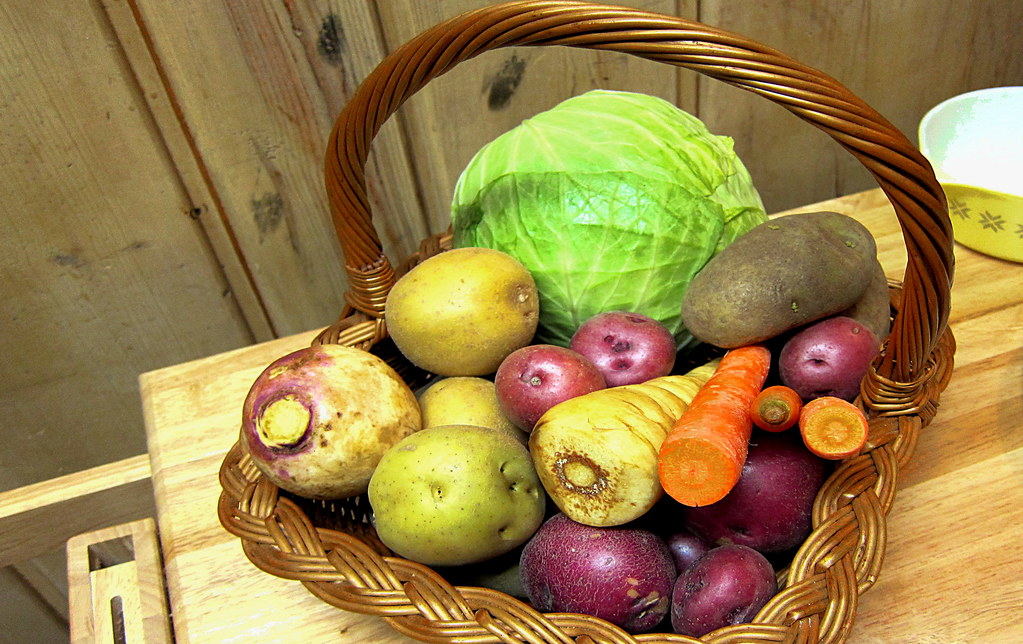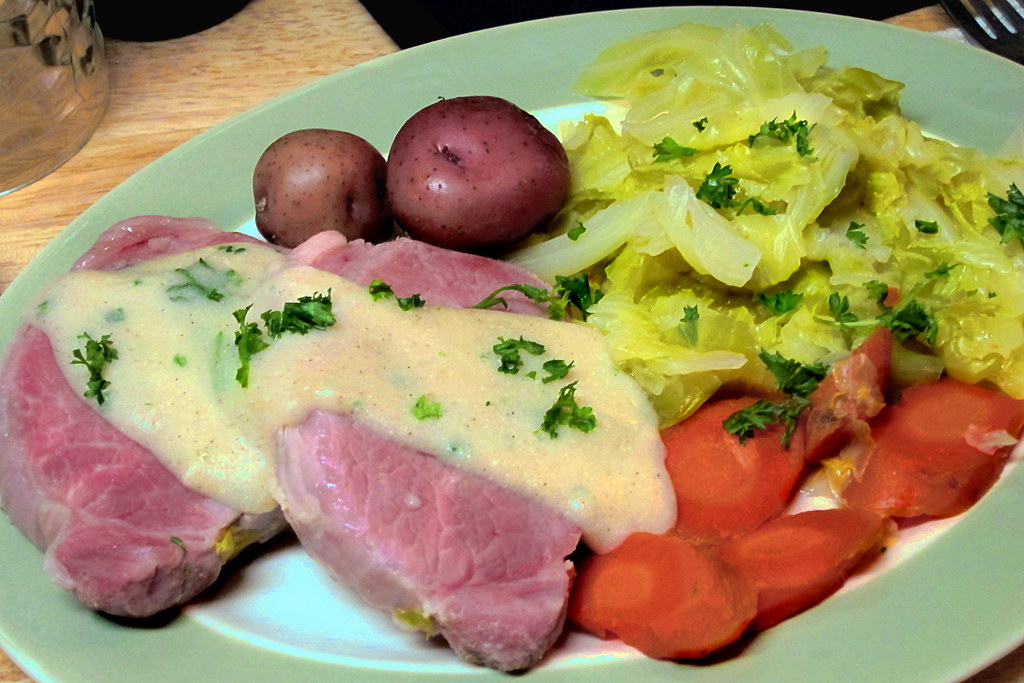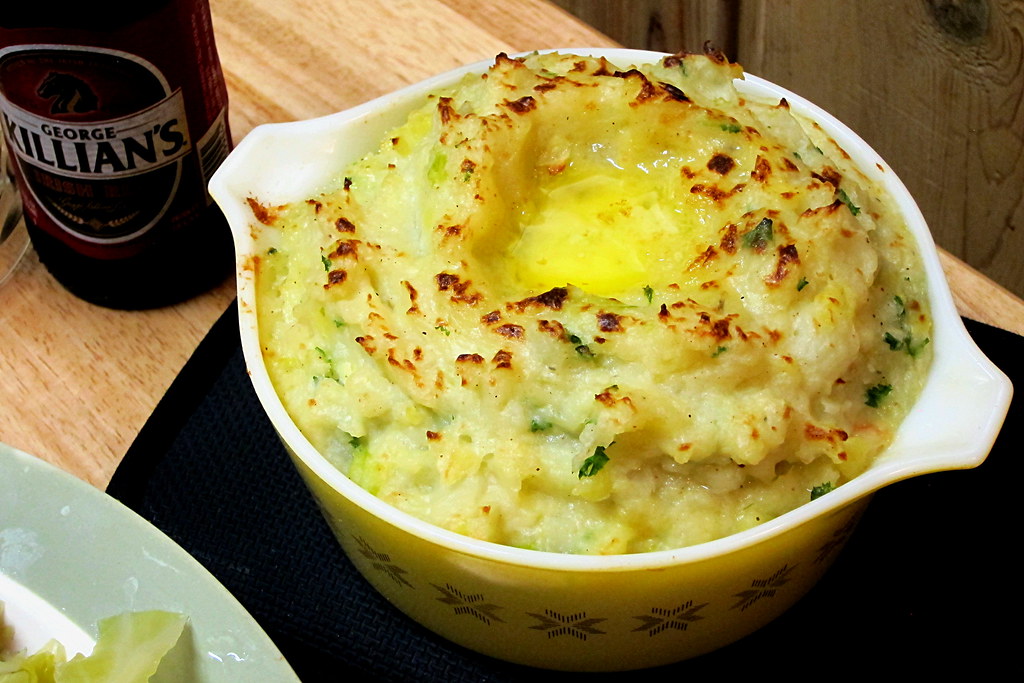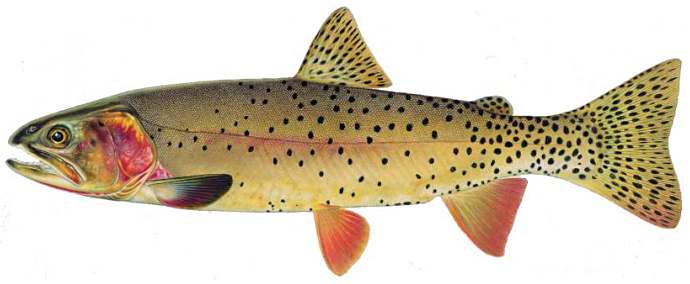KIDNAPPED BY IRISH PIRATES
Sold Into Slavery
forced to herd sheep and swine
 |
| WALLPAPER: THE ROOTS OF IRISH COOKING |
-------
.. Last evening, and this morning has been soft and damp. Drizzle has blessed us and hastened the melting of the snow. It's just perfect for Saint Patrick's Day. The celebration as seen in the United States is a wonderfully American Tradition, (LINK.).. America invented the celebratory day and all the boozing and hoopla that is associated with it. In Ireland it was a very solemn observance through the mid 20th century. In fact, Irish pubs were closed on the feast day until the mid 1960's. The 35,000,000 folks of Irish descent in America continue their tradition and pretend that it's Irish.
.. They eat corned beef and cabbage, drink green beer, wear green garb, and kick up their heels, (no arms please,) in celebration of the feast day of an un-canonized saint. It's all good fun and most bewildering to the Irish of Ireland.
 |
Boiled Irish bacon and cabbage. Black and red
potatoes with carrots. A parsley and white wine
sauce with shallots and cabbage bits.
Now that's Irish for the feast day.
|
.. Irish bacon is a different cut than American bacon. It includes both the pork belly and the loin. It is cured similar to our bacon but without the smoke.
.. It is sliced, (thick or thin,) perpendicular to the way ours is sliced and is a true treat - boiled or baked or grilled or fried. We make our own.
.. Great aunt Cafleen would scold you soundly if she was guest at your table for the feast day and you served corned beef.
.. Just where did the corned beef come from? Simple enough. If any Irish family in the old country was lucky enough to have a cow it was viewed as a factory for milk and cheese. Don't eat the cow!
.. Pigs, roots, and sheep were for eating. The landed gentry, (most were Irish but many were English,) kept cattle on the good pastureland and shipped them to England for Bully Beef.
.. The Irish family generally depended on a meager root garden of spuds and other delicacies along with a pig or two. When the blight hit -- and hit again -- and persisted, starvation forced a population movement to better places. America was one of those better places.
.. The poor immigrants settled in the scruffy parts of New York - and thereabouts. The Irish were just one part of the ethnic stew that settled in these base environs: Jews, Germans, Italians, Catholics, etc.
.. The best butchers in these communities and neighborhoods were most often the Jews who were meticulous about butchering and observing their kosher laws. Of course there was no Irish bacon for the feast of Saint Patrick.
.. Contemporary American culture pretends that corned beef and cabbage is a wonderful Irish delicacy. More power to that folklore -- burp.
.. Even today root crops are a staple of Irish cuisine and it's not uncommon to see several kinds of potatoes served in various ways with each meal The Colcannon Mash is absolutely scrumptious.
.. So as you gobble your corned beef and cabbage, and quaff your umpteenth dark and bitter beer and pretend that the Irish invented revelry to go along with a saint that isn't; remember that there were no snakes in Ireland and that even today it is one of the modern world's most hospitable places for rats.
.. Tomorrow you will be stuck with more cabbage than you can stomach and boiled corned beef that makes only a poor Reuben sandwich.
.. The left over Irish bacon, on the other hand can be fried. The mash can be fried. Bacon and potato pancakes sounds fine to us.
.. Saint Patrick finally escaped from his Irish slave masters and returned to England where he devoutly became a Catholic cleric.
.. He then returned to Ireland, and brought with him Christianity. Turn about is fair play.
-------
 |
| WALLPAPER: GREAT AUNT CAFLEEN'S IRISH FEAST FOR TODAY |





.jpg)




